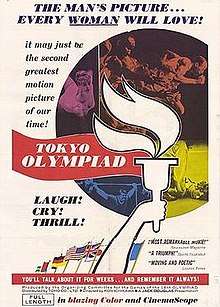Tokyo Olympiad
| Tokyo Olympiad | |
|---|---|
 | |
| Directed by | Kon Ichikawa |
| Produced by | Suketaro Taguchi[1] |
| Screenplay by |
|
| Narrated by | Ichiro Mikuni[1] |
| Music by | Toshiro Mayuzumi[1] |
| Cinematography |
|
| Edited by | Yoshio Ebara[1] |
Production company |
Organizing Committee for the Games of the XVIII Olympiad[1] |
| Distributed by | Toho |
Release date |
|
Running time | 169 minutes |
| Country | Japan |
| Language | Japanese |
Tokyo Olympiad (東京オリンピック Tōkyō Orinpikku) is a 1965 documentary film directed by Kon Ichikawa which documents the 1964 Summer Olympics in Tokyo. Like Leni Riefenstahl's Olympia, which documented the 1936 Summer Olympics in Berlin, Ichikawa's film was considered a milestone in documentary filmmaking. However, Tokyo Olympiad keeps its focus more on the atmosphere of the games and the human side of the athletes instead of concentrating on winning and the results. It is one of the few sports documentaries included in the book 1001 Movies You Must See Before You Die.
Production history
The 1964 Summer Olympics were seen as vitally important to the Japanese government. Much of Japan's infrastructure had been destroyed during World War II and the Olympics were seen as a chance to re-introduce Japan to the world and show off its new modernised roads and industry as well as its burgeoning economy. Every Olympics since the first modern games in 1896 Summer Olympics had been committed to film to some extent or another, usually financed by the International Olympic Committee (IOC) for reasons of posterity. For the 1964 Olympics the Japanese government decided to finance their own film and initially hired Akira Kurosawa who, at the time, was the most famous Japanese director worldwide thanks to films such as Ikiru and Seven Samurai. However, Kurosawa's famous tendency for complete control - he demanded to not only direct the film but the opening and closing ceremonies as well - led to his dismissal. This led to the bringing in of Ichikawa, who had a reputation of coming into productions where events hadn't followed the initial plans.
Controversy
Ichikawa's vision of the Tokyo Olympics was controversial at the time as it was the opposite of what the Japanese government wanted and expected of the film. Ichikawa presented a film which was very much a cinematic and artistic recording of the events, more concerned with the athletes than the events, than the journalistic, historical recording that was desired by its financiers. As a result, the Japanese Olympic Committee forced Ichikawa to re-edit the picture to better suit their requirements, with the final, re-edited, version clocking in at 93 minutes rather than the original's 170 minutes.
Release
Tokyo Olympiad was released theatrically in Japan on 20 March 1965 where it was distributed by Toho.[1] It had a 169-minute runtime that included an intermission.[1]
The film was released in the United States by American International Pictures, Pan-World Film Exchange and Jack Douglas Enterprises with an English narration.[1] It was released on 20 October 1965 with a 93-minute runtime.[1] The film was reissued in 1984 by Janus Films and Night Kitchen, Inc. with English subtitles at a 169-minute runtime.[1]
Reception
The film is held in very high regard and is seen, alongside Leni Riefenstahl's Olympia, as one of the best films about the Olympics and one of the best sports documentaries of all time. Based on 11 reviews collected by the film review aggregator Rotten Tomatoes, 100% of critics gave the film a positive review.[2] Ichikawa was recognised by the IOC with the award of the Olympic Diploma of Merit.
Availability
The film is somewhat difficult to find in the west, with the Criterion Collection DVD version out of print. It can be found on eBay fairly regularly, however, often fetching prices of between £35/$70. It can also be found on video from Home Vision Entertainment (distributor of the Criterion Collection) in the US and Tartan Video in the UK, though these too are out of print and can fetch prices of upwards of £30/$60.
In 2013, the official Olympic YouTube channel made a 125-minute version available in its entirety on the internet.[3]
Other official films of the Olympic Games
- Olympia (1938), directed by Leni Riefenstahl about Berlin 1936
- La grande olimpiade (1961), directed by Romolo Marcellini about Rome 1960
- Visions of Eight (1973), an anthology film about Munich 1972
- 16 Days of Glory (1986), directed by Bud Greenspan about Los Angeles 1984
See also
- 1964 Summer Paralympics
- 1964 Winter Olympics
- Olympic Games celebrated in Japan
References
- 1 2 3 4 5 6 7 8 9 10 11 12 Galbraith IV 2008, p. 218.
- ↑ "Tokyo Olympiad (1965)". Rotten Tomatoes. Retrieved September 10, 2009.
- ↑ "The Complete Tokyo 1964 Olympics Film". Retrieved October 27, 2015.
Sources
- Galbraith IV, Stuart (2008). The Toho Studios Story: A History and Complete Filmography. Scarecrow Press. ISBN 1461673747.
External links
- Tokyo Olympiad on IMDb
- Tokyo Olympiad at AllMovie
- Tokyo Olympiad at Rotten Tomatoes
- "東京オリンピック (Tōkyō Orinpikku)" (in Japanese). Japanese Movie Database. Retrieved 2007-07-17.
- Tokyo Olympiad an essay by George Plimpton at the Criterion Collection